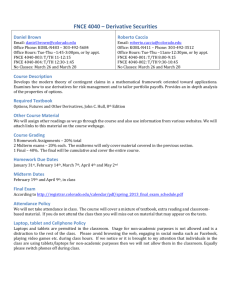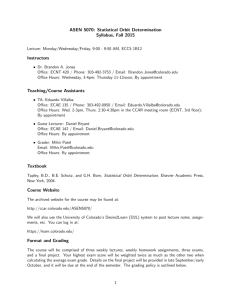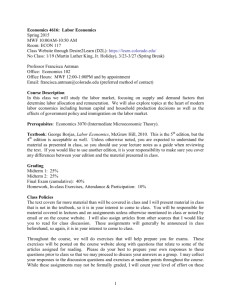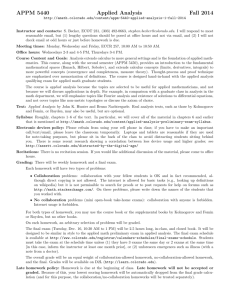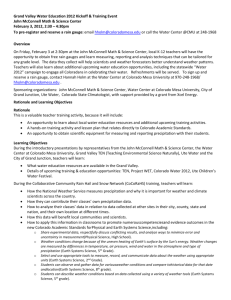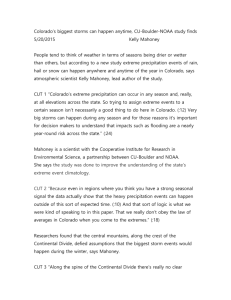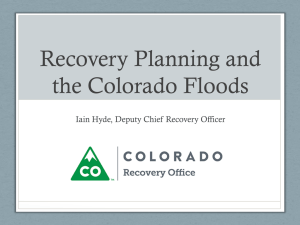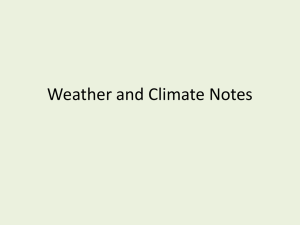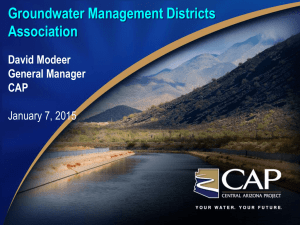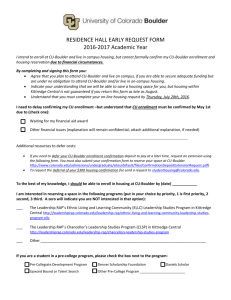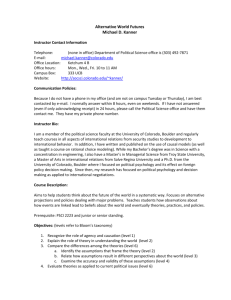Syllabus (.doc) - University of Colorado Boulder
advertisement
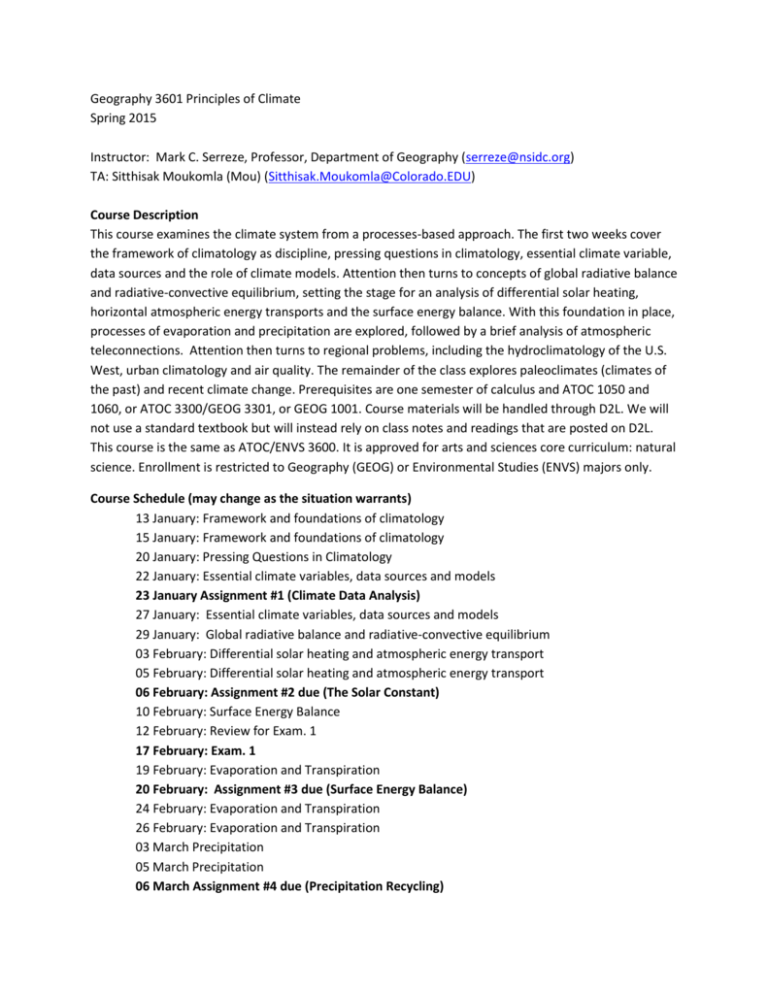
Geography 3601 Principles of Climate Spring 2015 Instructor: Mark C. Serreze, Professor, Department of Geography (serreze@nsidc.org) TA: Sitthisak Moukomla (Mou) (Sitthisak.Moukomla@Colorado.EDU) Course Description This course examines the climate system from a processes-based approach. The first two weeks cover the framework of climatology as discipline, pressing questions in climatology, essential climate variable, data sources and the role of climate models. Attention then turns to concepts of global radiative balance and radiative-convective equilibrium, setting the stage for an analysis of differential solar heating, horizontal atmospheric energy transports and the surface energy balance. With this foundation in place, processes of evaporation and precipitation are explored, followed by a brief analysis of atmospheric teleconnections. Attention then turns to regional problems, including the hydroclimatology of the U.S. West, urban climatology and air quality. The remainder of the class explores paleoclimates (climates of the past) and recent climate change. Prerequisites are one semester of calculus and ATOC 1050 and 1060, or ATOC 3300/GEOG 3301, or GEOG 1001. Course materials will be handled through D2L. We will not use a standard textbook but will instead rely on class notes and readings that are posted on D2L. This course is the same as ATOC/ENVS 3600. It is approved for arts and sciences core curriculum: natural science. Enrollment is restricted to Geography (GEOG) or Environmental Studies (ENVS) majors only. Course Schedule (may change as the situation warrants) 13 January: Framework and foundations of climatology 15 January: Framework and foundations of climatology 20 January: Pressing Questions in Climatology 22 January: Essential climate variables, data sources and models 23 January Assignment #1 (Climate Data Analysis) 27 January: Essential climate variables, data sources and models 29 January: Global radiative balance and radiative-convective equilibrium 03 February: Differential solar heating and atmospheric energy transport 05 February: Differential solar heating and atmospheric energy transport 06 February: Assignment #2 due (The Solar Constant) 10 February: Surface Energy Balance 12 February: Review for Exam. 1 17 February: Exam. 1 19 February: Evaporation and Transpiration 20 February: Assignment #3 due (Surface Energy Balance) 24 February: Evaporation and Transpiration 26 February: Evaporation and Transpiration 03 March Precipitation 05 March Precipitation 06 March Assignment #4 due (Precipitation Recycling) 10 March: Precipitation 12 March: Atmospheric Teleconnections 17 March: Hydroclimatology of the U.S. West 19 March: Hydroclimatology of the U.S. West 20 March: Assignment #5 due (Changing the Water Cycle) 24 March: No Class, Spring Break 26 March No Class, Spring Break 31 March Review for Exam 2. 02 April Exam 2 07 April: Guest Lecture: The Coldest Place on the Planet (Dr. Ted Scambos, NSIDC) 09 April: Urban Climatology 14 April: Air Quality 16 April: Paleoclimates 17 April: Assignment #6 due (Essay of Your Choice) 21 April: Paleoclimates 23 April: Recent Climate Change 28 April: Recent Climate Change 30 April: Review for Final and Wrap up Grading There will be three exams (two midterms and a final; the latter cumulative) and six homework assignments that include quantitative analysis. The grading breakdown is as follows: Midterm Exam #1: 15% of total Midterm Exam #2: 15% of total Final: Exam 15% of total Homework assignments: 50% of total (the six homework assignments are of varying length and each will be weighted based on length). Class attendance and participation: 5% University of Colorado Policies Disability Services: If you qualify for accommodations because of a disability, please submit to your professor a letter from Disability Services in a timely manner (for exam accommodations provide your letter at least one week prior to the exam) so that your needs can be addressed. Disability Services determines accommodations based on documented disabilities. Contact Disability Services at 303-492-8671 or by e-mail at dsinfo@colorado.edu.If you have a temporary medical condition or injury, see Temporary Medical Conditions: Injuries, Surgeries, and Illnesses guidelines under Quick Links at Disability Services website (http://disabilityservices.colorado.edu) and discuss your needs with your professor. Religious obligations: Campus policy regarding religious observances requires that faculty make every effort to deal reasonably and fairly deal with all students who, because of religious obligations, have conflicts with scheduled exams, assignments or required attendance. See full details at http://www.colorado.edu/policies/fac_relig.html Classroom Behavior: Students and faculty each have responsibility for maintaining an appropriate learning environment. Those who fail to adhere to such behavioral standards may be subject to discipline. Professional courtesy and sensitivity are especially important with respect to individuals and topics dealing with differences of race, color, culture, religion, creed, politics, veteran’s status, sexual orientation, gender, gender identity and gender expression, age, disability, and nationalities. Class rosters are provided to the instructor with the student’s legal name. I will gladly honor your request to address you by an alternate name or gender pronoun. Please advise me of this preference early in the semester so that I may make appropriate changes to my records. See policies at http://www.colorado.edu/policies/classbehavior.html and at http://www.colorado.edu/studentaffairs/judicialaffairs/code.html#student_code. Discrimination and Harassment: The University of Colorado Boulder (CU-Boulder) is committed to maintaining a positive learning, working, and living environment. The University of Colorado does not discriminate on the basis of race, color, national origin, sex, age, disability, creed, religion, sexual orientation, or veteran status in admission and access to, and treatment and employment in, its educational programs and activities. (Regent Law, Article 10, amended 11/8/2001). CU-Boulder will not tolerate acts of discrimination or harassment based upon Protected Classes or related retaliation against or by any employee or student. For purposes of this CU-Boulder policy, "Protected Classes" refers to race, color, national origin, sex, pregnancy, age, disability, creed, religion, sexual orientation, gender identity, gender expression, or veteran status. Individuals who believe they have been discriminated against should contact the Office of Discrimination and Harassment (ODH) at 303-492-2127 or the Office of Student Conduct (OSC) at 303492-5550. Information about the ODH, the above referenced policies, and the campus resources available to assist individuals regarding discrimination or harassment can be obtained at http://hr.colorado.edu/dh/Pages/default.aspx Academic Integrity / Honor Code: All students of the University of Colorado at Boulder are responsible for knowing and adhering to the academic integrity policy of this institution. Violations of this policy may include: cheating, plagiarism, aid of academic dishonesty, fabrication, lying, bribery, and threatening behavior. All incidents of academic misconduct shall be reported to the Honor Code Council (honor@colorado.edu; 303-7352273). Students who are found to be in violation of the academic integrity policy will be subject to both academic sanctions from the faculty member and non-academic sanctions (including but not limited to university probation, suspension, or expulsion). Other information on the Honor Code can be found at http://www.colorado.edu/policies/honor.html and at http://honorcode.colorado.edu.
